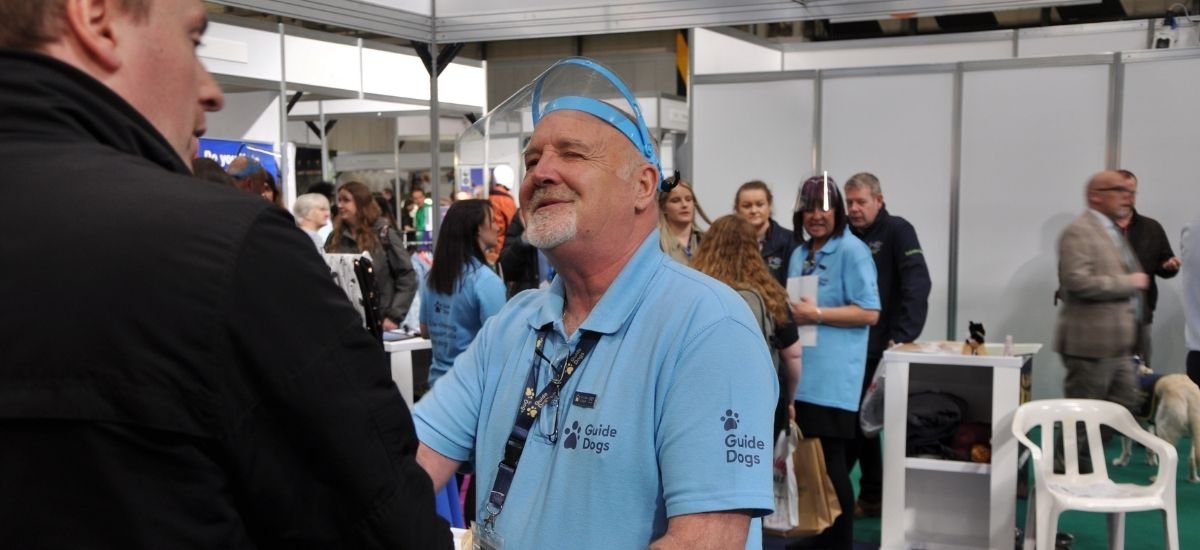Magic words that work in charitable fundraising
When face to face fundraisers are first trained, they’re taught a lot about behaviour and compliance which is unquestionably important to the role. But charitable fundraising also needs excellent communication skills.
Things like body language, tone of voice and eye contact all count towards being a good communicator, but what about the actual words we use?
Beyond the well used professional fundraiser script, we’ve found some water tight magic fundraising words to help get the best out of every donor. With these 10 magical words for words for charity work and fundraising, regular charity donations could be more attainable than ever!
Magic word #1 - You
Charities and non-profits just love to talk about themselves, their needs and their accomplishments. This isn’t necessarily a bad thing, but when you want something from someone, it’s far more impactful to turn it around and make it about the donor instead.
The first of our magical fundraising words is ‘YOU’ - We should never under estimate it’s power!
When we use the term ‘you’ and ‘yours’, we’re making a number of psychological shifts.
Firstly, when we use direct reference with ‘you’, we essentially transfer the power to act to the listener.
Using ‘you’ is attention grabbing, instantly inclusive and makes a fundraising pitch 100% personal.
Just check this example to see how powerful it can be to change that one word from ‘we’ to ‘you’:
“We provided over a thousand breast cancer nurses to women going through breast cancer”.
“You provided over a thousand breast cancer nurses to women going through breast cancer”.
Instantly the recipient is made to feel like they are part of the superpower that’s making change for the better. Uplifting and motivational, you assume your donors to be the very best version of themselves and invite them to rise to that occasion.
Making their charity donation about how the donor can change lives (even before they’ve made the donation), it’s enforcing how they themselves have the capacity to re-enact the mission statement of the charities.
By directly referring to the listening, we also transfer a sense of responsibility to help too.
The donor becomes a central character in the fundraisers story.
Phrases such as ‘you can do this’ or ‘your dedication can make this happen’ empowers the donor by showcasing what it is to be a change maker. They are literally handed the key to the proverbial door of do-gooding.
Finally, using ‘you’ and ‘your’ enables any divide between donor and charity can be dismantled. You can be collective too which means a strong sense of unity is created.
Magic word #2 - Because
The next of our magic fundraiser words is ‘because’. Research by Ellen Langer from Harvard in 1978 set out to prove the power of the word ‘because’ with a simple experiment.
The experiment showed that to obtain approval and then consent, the word ‘because’ had enough potency to significantly increase success.
To demonstrate, a person attempted to jump a queue to use a shared photocopier.
In the first instance the person wanting to queue jump simply asking if they could go ahead
“Excuse me, I have some pages and I need to use the photocopier”.
The success rate for this was 60%.
But when they applied ‘because’ to their ask;
“Excuse me, I have some pages and I need to use the photocopier because I’m in a hurry”
they saw that 94% of people allowed them to go in front of them.
Even when the reason wasn’t especially compelling and the queue jumper simply said
“Excuse me, I have some pages and I need to use the photocopier because I have to make copies”
it still got a 93% success rate!
It turns out that the human brain responds positively to explanation. Simply by adding ‘because’ on to the end of statements, you’re tapping into the subconscious and reassuring part of the brain with reasoning, logic and purpose.
That means people tend to go on autopilot and comply to the request – particularly if the stakes are low.
“When you don’t pay direct attention to something, your brain puts little importance on it.”
– Robert Cialdini
‘Because’ fulfils the need for explanation and confirms a truth about necessity.
Often when people respond to fundraisers, they’re on an automatic defense, thinking of how quickly they can say no.
By giving the additional detail that the word ‘because’ allows, you’re mentally opening doors of further communication. By applying a ‘because’ in your sentence, you’re refocusing the person to respond mindfully rather than mindlessly.
If fundraisers can give an expressed reason as oppose to an implied reason they’ll find results dramatically improve.
For example, rather than just saying
’55,000 women in the UK are diagnosed with Breast Cancer each year and need help.”
A fundraiser could say
’55,000 women in the UK are diagnosed with Breast Cancer each year and need help because the NHS can’t help guide them through the emotional, financial and logistical implications of having breast cancer. But Breast Cancer Now can’.
Magic word #3 - Small
Another word for fundraising magic is ‘small’. In fact it works for other stuff too - It’s no coincidence that the strapline ‘every little helps’ has worked wonders for a certain supermarket in Britain!
They say small is beautiful and in fundraising verbiage it most certainly is.
Using ‘small’ can seem to be counterintuitive because you run the risk of making a donors gift feel less significant. But actually ‘small’ can work wonders on the flipside.
The theory runs much like the saying ‘many hands make light work’.
When a fundraiser uses the word small, the intention is to make a potential donor feel that they can be a part of the solution with very little contribution. It’s basically highlighting the amount of effort needed – which really isn’t much overall.
As part of his research about influence and persuasion, Robert Cialdini did a study on fundraisers who were soliciting donations for the American Cancer Society. Split into two groups, one of the fundraisers groups asked
‘Would you be willing to help by giving a donation?’
And those in the other group asked
‘Would you be willing to help by giving a donation? Every penny will help’.
Astonishingly, they discovered that potential donors asked in the second way were nearly twice as likely to agree to donate (28% vs 50%).
If that wasn’t interesting enough, it was also found that the amount donated did not differ. It seems that just by knowing a penny could help was enough of a trigger to get people to say yes to helping.
Another interesting study about using the word small came from Carnegie Mellon University.
A simple advertisement described a delivery charge as being ‘a $5 fee’. A second ad was then created that was almost identical except for a tweak to the words which now read ‘a small $5 fee’.
Just by adding the word small, 20% more consumers decided to buy.
This approach works particularly well for those least likely to part with their money, who represent around 25% of buyers. These type of consumers nearly always feel a sense of pain when spending money and by using reductionist language like ‘small’ you’re appealing to their over developed sense of attachment to money.
And it turns out that using the word small is already popular in raising funds. Here’s a tweet from the Green Party’s Natalie Bennett appealing for help
💚 We need your help to bring the positive Green alternative into the #HouseofLords and to fight the 38 regressive Government Bills coming our way in the next 12 months
— Natalie Bennett (@natalieben) June 20, 2022
⬇️ Please, if you can, set up a small monthly donation here ⬇️https://t.co/ksNnb3waDa pic.twitter.com/1uDglqTg0D
Magic word #4 - Today
Another of the magic words for charitable conversions is the word ‘today’.
Using ‘today’ helps to create a sense of urgency.
A lot of the time when people are asked to part with their hard earned cash they might think of ways to get out of it.
One of these ways is to promise to do it later and then keep putting it off until it’s simply not on the ‘to do’ list any more.
Instead, when fundraisers make a point of asking for the donation or help ‘today’ it encourages donors to give without delay.
Although many donors understand that at some point they’ll be asked for donations, it’s a good idea to make the campaign feel more pressing, which adds a little more weight to their decision.
Tying in reasons about why your charity needs a donation right away is to re-enforce the need to act immediately.
For example
“By making a donation today, you’re helping to avoid dogs dying on the streets during the coldest winter months”.
Magic word #5 - Easy
As aforementioned, donors often look for excuses not to donate – by using the word easy you’re reassuring them that this will be minimal effort.
The bottom line is that not only are fundraisers asking for money, they’re also asking for time to stand and listen to them. The very least we can do is make it as painless as possible right?
Any fundraising organisation worth their salt knows that making it as easy and quick as possible for donors to go ahead is vital to gaining the most donations.
By using fundraising language like ‘easy’ we’re assuring the potential donor that the process will be as amenable as it can be whilst removing any psychological obstacles.
Using simple phrases like
“It’s so easy to donate it really takes just two or three minutes of your time”
makes things sound attainable and hassle free. It also implies that you’d have to be pretty unfair minded not to go ahead.
Another thing about fundraising wording like ‘easy’ is to use it to describe the ease of helping beneficiaries if you just had enough funds. For example –
“It’s so easy for us to help these dogs with the right funding because our expert dog trainers are already in place. We just need the funds to support them”
Magic word #6 - Immediately
Western culture has created a seriously impatient bunch of individuals. Ever since digitalisation, we expect everything to be immediate!
The expectation of instant gratification trickles through into charitable donations and corresponding charitable words too.
When a donation is made, donors want to see results quickly. That means they want a quick acknowledgment and thank you and news of how their donation has made an impact.
On that note, a great word for charitable fundraising pitches is ‘immediately’. You could also use ‘now’ or ‘instantaneously’ for the same impact.
Using these magic words works because people are literally programmed to want things to happen right away (or as quickly as possible).
The mid brain (where the pleasure centre lives) is shown to react to the promise of immediate gratification.
On the other hand, the frontal cortex in the brain triggers an anxiety reaction whenever we’re faced with having to wait for things.
During their pitch, fundraisers should make sure the donor knows that they’ll be getting instantaneous results when they make that decision to donate.
In all cases, when choosing to donate, the immediacy happens in the form of a warm fuzzy feeling of knowing they’ve just done something amazing to help another being.
The immediate reward from giving results in a sense of emotional pride or egoism which is one of the favourite reasons psychologists say people decide to give.
Learn more about why people decide to give to charity here
The fundraiser could say something like
“By choosing to donate today, you could immediately help to start saving dogs in need from being put down”
Or
“Each donation we receive is instantly put to good use, funding the amazing nurses who help people living with breast cancer”
Magic word #7 - Expert
Did you know that to be considered an expert you only need to know 10% more than the average?
The fact is, we’re wired up to look for leaders and experts (or be one) in order to make informed decisions about all manner of things.
Reflecting this claim we can look at Psychologist Robert Cialdini’s 6 fundamental principles of persuasion. One of these principles is Authority.
“Authority; people often react in an automated fashion to commands from authority and even to symbols of power. “
Just by including the word expert in a call to action, retailers in skincare saw a 137% increase in conversions (i.e. people following up on an advert) and enjoyed a 22% increase in sales.
Charitable organisations should be tapping into presenting as experts and displaying the most knowledge and expertise in their field.
Gaining this type of reputation means that non-profits gain trust from the public and donors alike. Having authority and expertise is especially important since public opinion on charities has taken such a hit in recent years.
Showcasing and mentioning professionals who are linked to a charity invariably proves credibility. This might include researchers, scientists, medical professionals or those with many years’ experience in the field.
Fundraisers should use testimonials from experts to emphasise impact. See the difference in applying the word ‘expert’ to a fundraising pitch:
“Would you support Breast Cancer Now’s research and help change the lives of millions of women living with breast cancer?”
“Would you support our experts in the Breast Cancer Now research centre to help change the lives of millions of women living with breast cancer?”
Magic word #8 - Support
Another small change with a big impact is to find another word for donation. Instead of using the word ‘donate’, it’s been shown that the word ‘support’ can have much more influence.
In fact, the rate of donations online is said to increase by 16% when using the word ‘support’ instead of donate!
Magic word #9 - Join
Humans are herd animals and often respond well to the concept of belonging to a group.
Using words from charity fundraisers like ‘join’ appeals to the sense that they’re doing something that others are already doing. They’ll be approved of and will be welcomed in as a ‘member’.
When unsure about what to do, we’ll often look to others behaviours to help us decide. If a pre-established group or organisation invites us in and it aligns with our morals and beliefs, humans are far more likely to conform.
Examples of using join might be
“Join the thousands of members who donate to Dogs Trust and help save the lives of dogs who can’t fend for themselves”
“Make a difference to people living with Breast Cancer. Join us and sponsor a nurse today to make the lives of people like Jess easier”.
How to influence the amount people give
Going back to Robert Cialdini’s 6 principles of persuasion, social proof is where people generally look to others similar to themselves when making decisions. This is particularly noticeable when faced with uncertainty or ambiguity.
When faced with a choice of how much to donate to charity with relating outcomes, studies show that by highlighting one specific amount over others gave an increase of 12% on the average donation.
Basically, when guided towards a typical amount of what others deemed acceptable, donors were happier to go with the protocol.
Magic word #10 - Thank you
If you were going to use any of the magic words for charity fundraisers we’ve mentioned today, perhaps this one is the most important of all.
Fundraisers should always immediately thank someone for their time when they stop to converse. This is because it sets the scene for a good exchange.
Not only are people are far more receptive when there’s potential of something positive, it also makes a great first impression of the fundraiser.
It’s always important to be polite and basically a nice person – but especially if you’re intending on asking for something! This is because people are far more inclined to agree to a request from someone they like (another of Cialdini’s 6 principles of influence).
Former FBI Behavioural Analyst, Dr Jack Shafter explains that
“Certain words reflect the behavioural characters of the person who spoke or wrote them…Word clues increase the probability of predicting behavioural characteristics”
Whatever comes out of your mouth is basically giving others scope to make assumptions about your character. This might sound obvious, but by purposefully choosing words to increase the likelihood of a positive impression, the outcome will inevitably be better.
Words associated with fundraising should always be as positive as possible and research on how to retain donors shows that one of the most important single thing a charity can do is thank people – personally, promptly, at a level that reflects their contribution.
In fact, one study even showed that provided it was made within 24-48 hours of the gift received, a thank you call from a board member to a newly acquired donor increased their next gift by 39%!
So we know that for donor retention, saying thank you had clear importance.
Donor management software specialists ‘Bloomerang’ examined the results of 3,729 non-profit organisations and their 1,915,939 donors. They specifically looked at first time donations between the years 2012-2018.
Those who received no thank you call within 90 days had a 33% retention rate.
That retention rate increased to 41.24% if one phone call was made and to 58.21% if more than one phone call is made within 90 days.
When we thank a person for their behaviour it again affirms to them that they are approved of and indeed correct in their behaviour – indicating acceptance which is something all humans tend to crave. This boosts self-esteem and confidence.
Obviously different ways of fundraising have different needs for thank yous.
From the perspective of a face to face fundraiser such as those in the teams here at Charity Link, verbal thanks is equally important, since this is the very first interaction most potential donors will have had with the charity.
Donor commitment and consistency
What we also know about human behaviour is that commitment and consistency can be really important to people. Generally people want to appear consistent in their behaviour.
People tend to repeat decisions they’ve made previously because it aligns with how they wish to present and their perception of self.
These simple but magic non charity words can make all the difference in fundraising. Whilst sales skills are great, fundraisers should always remember that emotion is at the heart of every charity.
Appealing to people’s better nature by using emotion to get the message of a charity’s cause across will always work best. Take your donor on a journey, tell them the story of the people you’re trying to help and help them find the empathy they need to decide to give.
Equally fundraisers should be mindful to show lots of pictures to their potential donor during their pitch. This is simply because people respond far more powerfully to imagery than written or spoken word.
Just one powerful image can tell the whole story, helping donors to relate to the cause more strongly and gage a positive reaction to wanting to help.
Read more about how to use psychology with donors here
Charity Link make it our business to know all the very best fundraising tips and tricks and we make sure our professional fundraisers receive the very best in fundraising training.
Not only does this ensure the best results for our charity partners and ultimately help more people and animals in need, it increases job satisfaction.
Read more about fundraiser training here
Remember, no one size fits all and what works for one might not work for another. For this reason fundraisers should always try new approaches and test what gets the best results.
Interested in a career in professional fundraising?
Charity Link offer comprehensive support from day one. Our committed back office team are always on hand to offer anything our fundraisers need, from great training and incentives to ongoing mentoring with our team managers and HR department.
“You’d be hard pressed to find a company that is more dedicated to helping its workforce thrive, while they do genuinely great work for charities” – Indeed review












